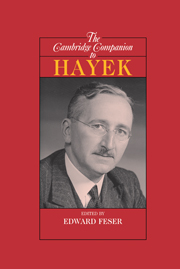Book contents
- Frontmatter
- Introduction
- 1 Hayek and the Austrian tradition
- 2 Hayek on money and the business cycle
- 3 Hayek and market socialism
- 4 Hayek and Marx
- 5 Hayek versus Keynes: the road to reconciliation
- 6 Hayek on knowledge, economics, and society
- 7 Hayek and Popper: the road to serfdom and the open society
- 8 Hayek’s politics
- 9 Hayek the philosopher of law
- 10 Hayek and liberalism
- 11 Hayek and conservatism
- 12 Hayek on the evolution of society and mind
- 13 Hayek on justice and the order of actions
- 14 Hayek the cognitive scientist and philosopher of mind
- Guide to Further reading
- Bibliography
- Index
7 - Hayek and Popper: the road to serfdom and the open society
Published online by Cambridge University Press: 28 January 2007
- Frontmatter
- Introduction
- 1 Hayek and the Austrian tradition
- 2 Hayek on money and the business cycle
- 3 Hayek and market socialism
- 4 Hayek and Marx
- 5 Hayek versus Keynes: the road to reconciliation
- 6 Hayek on knowledge, economics, and society
- 7 Hayek and Popper: the road to serfdom and the open society
- 8 Hayek’s politics
- 9 Hayek the philosopher of law
- 10 Hayek and liberalism
- 11 Hayek and conservatism
- 12 Hayek on the evolution of society and mind
- 13 Hayek on justice and the order of actions
- 14 Hayek the cognitive scientist and philosopher of mind
- Guide to Further reading
- Bibliography
- Index
Summary
From the perspective of 2007 it is hard to put oneself in the frame of mind which dominated intellectual life in Britain and much of Europe sixty years ago, particularly over the question of socialism and state planning. Most intellectuals seemed to take socialism for granted. Many were or had been communists; many others were fellow travelers, and many of those who were not were, in Lenin's odious terms, “useful idiots.” We in the west were, after all, allies of Soviet communism in the fight against Nazism and fascism, Stalin was familiarly known as “Uncle Joe,” and in the British armed forces education officers were vigorously promoting the virtues of leftist approaches to postwar reconstruction. The Spanish Civil War, only a few years earlier, had rallied many European intellectuals to the republican cause, and in Britain at least one would have been hard put to find a voice favoring the nationalists outside the small and supposedly benighted ranks of right-wing Catholicism.
We will leave aside the intriguing question as to what might have been the future of postwar Europe had the communists won in Spain. (With the Nazi-Soviet pact of 1938, had Spain gone communist, would there even have been a postwar Europe remotely analogous to the one which actually arose? And even if there had been, would a communist regime in Spain have confined its influence and activity to the Iberian peninsula?) In 1945, such questions could hardly have been raised at all, and even in 2007, this chapter of counterfactual history might be too hot a potato to handle, and would in any case take us too far from our theme.
- Type
- Chapter
- Information
- The Cambridge Companion to Hayek , pp. 132 - 147Publisher: Cambridge University PressPrint publication year: 2006
- 1
- Cited by



